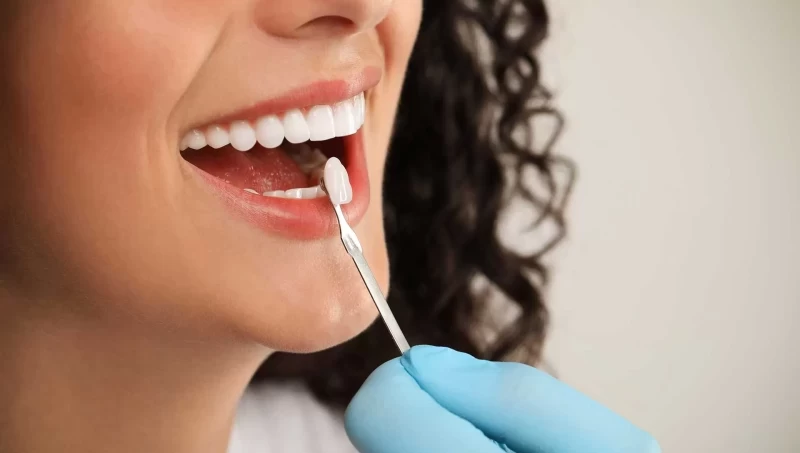TrustMed Clinic : What Are The Qualities Of Poorly Done Dental Veneers?

Dental veneers have long been a popular choice for those looking to enhance their smile. These thin shells, typically made of porcelain or composite resin, are custom-designed to cover the front surface of teeth, providing an immediate improvement in appearance. However, while veneers often deliver stunning results, there are instances where things can go wrong. Understanding the common reasons for bad veneers and how to prevent these issues is essential for anyone considering this cosmetic dental procedure.
1. Unsuitability for Veneers
One of the primary reasons veneers go wrong is that the patient may not have been a suitable candidate for the procedure in the first place. Veneers are not a one-size-fits-all solution, and certain conditions need to be met to ensure the best possible outcome.
- Healthy Gums: A patient with gum disease or unhealthy gums is not a good candidate for veneers. The gums must be in excellent condition because they play a crucial role in supporting the veneers and maintaining overall oral health.
- Strong Tooth Enamel: Since veneers are bonded to the tooth enamel, it must be strong and healthy. Teeth that are heavily filled or have significant enamel loss may not provide a stable foundation for veneers.
- Proper Alignment: While veneers can correct minor misalignment, they are not suitable for severely crooked teeth. Major misalignment should be addressed with orthodontic treatment before considering veneers.
- Teeth Grinding: Bruxism or teeth grinding, can significantly weaken both natural enamel and veneers. Patients who grind their teeth may not be suitable for veneers, or they may need to wear a night guard to protect their veneers from damage.
Ensuring that these factors are thoroughly evaluated by a qualified dentist before getting veneers can prevent many of the problems associated with unsuitability.
2. Poor Oral Health Care After the Procedure
Maintaining good oral hygiene is crucial for the longevity and success of veneers. Neglecting dental care after veneers are fitted can lead to several issues.
- Discoloration and Staining: Composite veneers are more prone to staining than porcelain veneers. Without regular brushing, flossing, and dental check-ups, composite veneers can discolor over time, diminishing their aesthetic appeal. Even though porcelain veneers are more resistant to stains, they still require good oral hygiene to maintain their appearance.
- Veneer Damage: Poor oral hygiene can lead to decay in the underlying tooth, weakening the bond between the tooth and the veneer. This can cause the veneer to chip, crack, or even detach. Regular dental visits allow your dentist to spot potential issues early and take corrective measures before the problem worsens.
To maintain the integrity of your veneers, it’s essential to brush and floss daily and avoid foods and drinks that are known to stain teeth, such as coffee, red wine, and certain berries.
3. Unnatural Appearance
One of the most common complaints about veneers gone wrong is that they can look unnatural. Poor craftsmanship, improper color matching, or choosing the wrong type of veneer can all contribute to a less-than-ideal outcome.
- Overly White or Shiny Veneers: If veneers are too white or have an unnatural shine, they can stand out against your natural teeth, creating a fake appearance. The goal of veneers is to enhance your smile subtly, blending seamlessly with your other teeth.
- Improper Thickness: Veneers that are too thick can cause the teeth to appear bulky and out of proportion, further contributing to an unnatural look.
Proper planning and communication with your dentist about your aesthetic goals are critical to achieving a natural and beautiful smile.
4. Ill-Fitting Veneers
Veneers that do not fit properly can cause significant discomfort and functional problems. Ill-fitting veneers can irritate the gums, interfere with your bite, and make it difficult to speak or eat.
- Size and Shape Issues: Veneers that are too large or too small can create an awkward fit, leading to discomfort or even pain. If the veneers are improperly shaped, they can also cause issues with biting and chewing, leading to further dental problems.
- Gum Irritation: Poorly fitted veneers can irritate the gum tissue, leading to inflammation and possible gum recession. This not only affects the appearance of your smile but also your overall oral health.
Ensuring a proper fit is crucial. A well-fitted veneer should align with your natural teeth and gums seamlessly, providing comfort and functionality while enhancing your smile.
5. Excessive Tooth Reduction
One of the more serious risks of bad veneer procedures is excessive tooth reduction. Veneers require the removal of a small amount of enamel to ensure a proper fit. However, when too much enamel is removed, it can weaken the natural tooth structure.
- Increased Tooth Sensitivity: Removing too much enamel can expose the underlying dentin, leading to heightened tooth sensitivity. This can make eating and drinking uncomfortable, particularly with hot or cold foods and beverages.
- Risk of Decay: Excessive enamel reduction can also increase the risk of tooth decay, as the protective layer of the tooth is compromised. This can lead to further dental issues that may require more extensive treatment.
To avoid excessive tooth reduction, it’s important to choose a skilled and experienced dentist who understands the balance between removing enough enamel to fit the veneer while preserving as much of the natural tooth as possible.
6. Poor Durability
The durability of veneers largely depends on the quality of the materials used and the skill of the dentist performing the procedure. Low-quality veneers are more prone to damage, such as chipping, cracking, or staining.
- Chipping and Cracking: Poorly made veneers are more susceptible to damage from everyday activities like biting into hard foods. This not only affects the appearance of the veneer but can also lead to the need for costly repairs or replacements.
- Staining: As mentioned earlier, composite veneers are more prone to staining than porcelain veneers. However, low-quality porcelain veneers can also lose their luster over time if not properly cared for.
To ensure your veneers are durable and long-lasting, it’s essential to invest in high-quality materials and choose a reputable dentist who has extensive experience in veneer procedures.
7. The Pitfalls of Poorly Executed Dental Procedures
Bad veneers are often the result of poor execution by an inexperienced or unskilled dentist. From improper fitting to inadequate bonding, several issues can arise when veneers are not applied correctly.
- Increased Risk of Tooth Decay: If veneers are not bonded correctly, they can create spaces where bacteria accumulate, leading to tooth decay and gum disease. This is particularly concerning with low-quality materials and inadequate dental procedures.
- Tooth Sensitivity: As previously mentioned, improperly placed veneers can lead to tooth sensitivity, especially if too much enamel is removed during preparation. This sensitivity can make everyday activities like eating and drinking uncomfortable, diminishing your quality of life.
To avoid the pitfalls of poorly executed dental procedures, it’s vital to thoroughly research and select a dentist with a proven track record of successful veneer applications.
How to Avoid Veneer Problems
While veneers are an excellent solution for many dental issues, they are not without their risks. Understanding the common reasons veneers can go wrong and how to prevent these issues is crucial for anyone considering this cosmetic procedure.
To ensure the best results:
- Choose a qualified and experienced dentist.
- Ensure you are a suitable candidate for veneers.
- Maintain good oral hygiene after the procedure.
- Avoid habits that can damage your veneers, such as teeth grinding.
- Regularly visit your dentist for check-ups and maintenance.
By taking these precautions, you can enjoy the benefits of veneers without the common pitfalls.






